Related Research Articles

Die Fledermaus is an operetta composed by Johann Strauss II to a German libretto by Karl Haffner and Richard Genée, which premiered in 1874.
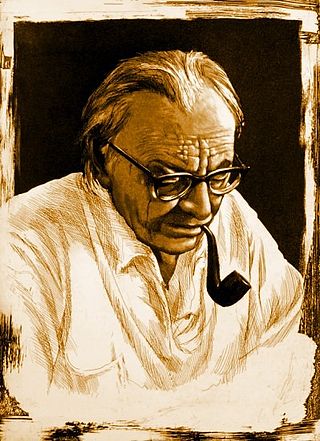
Antigonae (Antigone), written by Carl Orff, was first presented on 9 August 1949 under the direction of Ferenc Fricsay in the Felsenreitschule, Salzburg, Austria, as part of the Salzburg Festival. Antigonae is in Orff's words a "musical setting" for the Greek tragedy of the same name by Sophocles. However, it functions as an opera.

Das Veilchen vom Montmartre is an operetta in 3 acts by Hungarian composer Emmerich Kálmán. The libretto was written by Julius Brammer and Alfred Grünwald. It premiered in Vienna at the Johann Strauß-Theater on 21 March 1930.

The Gay Hussars is an operetta in three acts by Emmerich Kálmán. The piece was Kalman's first operetta and a hit throughout Europe and America. The first version, in Hungarian, Tatárjárás, with libretto by Karl von Bakonyi and Andor Gábor, premiered at the Vígszinház in Budapest on 22 February 1908. The German version, Ein Herbstmanöver, with libretto by K. von Bakonyi and Robert Bodanzky, premiered in Vienna on 22 January 1909. It was so popular that it prompted Kalman to move to Vienna.

Carl Michael Ziehrer was an Austrian composer. In his lifetime, he was one of the fiercest rivals of the Strauss family; most notably Johann Strauss II and Eduard Strauss.

Der Bettelstudent is an operetta in three acts by Carl Millöcker with a German libretto by Camillo Walzel and Richard Genée, based on Les noces de Fernande by Victorien Sardou and The Lady of Lyons by Edward Bulwer-Lytton. However, the librettists added the element of combining love and politics to the French comedy plots. It premiered in Vienna in 1882.

Boccaccio, oder Der Prinz von Palermo is an operetta in three acts by Franz von Suppé to a German libretto by Camillo Walzel and Richard Genée, based on the play by Jean-François Bayard, Adolphe de Leuven, Léon Lévy Brunswick and Arthur de Beauplan, based in turn on The Decameron by Giovanni Boccaccio. Despite the opera's clear links to the Viennese opera tradition, Suppé's opera takes most of its style from Italian opera.

Ein Walzertraum is an operetta by Oscar Straus with a German libretto by Leopold Jacobson and Felix Dörmann, based on the novella Nux, der Prinzgemahl by Hans Müller-Einigen from his 1905 book Buch der Abenteuer.

Der Graf von Luxemburg is an operetta in three acts by Franz Lehár to a German libretto by Alfred Willner, Robert Bodanzky, and Leo Stein. A Viennese take on bohemian life in Paris at the beginning of the 20th century, the story revolves around an impoverished aristocrat and a glamorous opera singer who have entered into a sham marriage without ever seeing each other and later fall in love at first sight, unaware that they are already husband and wife.
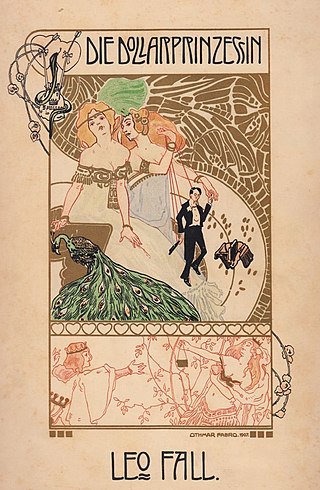
Die Dollarprinzessin is an operetta by Leo Fall. The German libretto was by Alfred Maria Willner and Fritz Grünbaum after the comedy Die Dollarprinzessinen by Emerich von Gatti and Thilo Friedrich Wilhelm von Trotha.
The Strollers is a musical in two acts and a prologue with music by Ludwig Engländer and a book and lyrics by Harry B. Smith. Set in Austria, the work is based on Leopold Krenn and Karl Lindau's libretto for the 1899 operetta Die Landstreicher by the composer Carl Michael Ziehrer. The work premiered on Broadway at the Knickerbocker Theatre on June 24, 1901. It closed at that theatre on August 31, 1901 after 70 performances. The Broadway production was directed by A. M. Holbrook and produced by George W. Lederer, Sam Nixon and J. Fred Zimmerman. The sets were designed by D. Frank Dodge and Ernest Albert, and the costumes were designed by Caroline Siedle. The production starred Francis Wilson as August Lump, Irene Bentley as Bertha, Eddie Foy as Kamfer, Marie George as Mimi, Harry Gilfoil as the Prince de Bomsky, Wilmer Bentley as Rudi von Rodenstein, and Louise Lawton as Anna.

The Carltheater was a theatre in Vienna. It was in the suburbs in Leopoldstadt at Praterstraße 31.

Gasparone is an operetta in three acts by Carl Millöcker to a German libretto by Friedrich Zell and Richard Genée. The libretto was later revised by Ernst Steffan and Paul Knepler. An amusing feature of the work is that the title character never appears and acts as a scapegoat upon which all the misdeeds in Syracuse, Sicily, can be blamed.
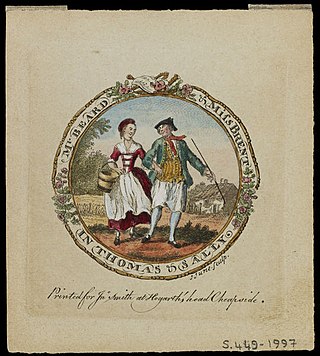
Thomas and Sally is a dramatic pastoral opera in two acts by the composer Thomas Arne with an English libretto by Isaac Bickerstaffe. The opera was meant to be performed as an "after piece", which is a short musical work to be performed after a spoken play.
Schwarzwaldmädel is a 1917 operetta in three acts by German composer Leon Jessel. The libretto is by August Neidhart, and the operetta premiered on 25 August 1917 at the old Komische Oper Berlin. It is the most popular operetta written in Germany.
A basso porto is an opera in three acts by composer Niccola Spinelli. The opera uses an Italian language libretto by Eugene Checchi which is based on Goffredo Cognetti's 1889 play O voto. The opera premiered to critical success at the Cologne Opera on April 18, 1894, sung in a German translation by Ludwig Hartmann and Otto Hess. The work is widely considered Spinelli's greatest composition, and the prelude to the opera's third act has been programmed by numerous orchestras for performances in concert.
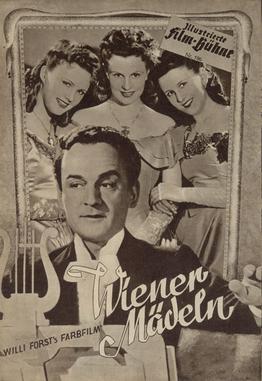
Viennese Girls is a 1945 historical musical film directed by Willi Forst and starring Forst, Anton Edthofer and Judith Holzmeister. The film was made by Wien-Film, a Vienna-based company set up after Austria had been incorporated into Greater Germany following the 1938 Anschluss. It was the third film in Forst's "Viennese Trilogy" which also included Operetta (1940) and Vienna Blood (1942). The film was finished in 1945, during the closing days of the Second World War. This led to severe delays in its release, which eventually took place in 1949 in two separate versions. One was released by the Soviet-backed Sovexport in the Eastern Bloc and the other by Forst.
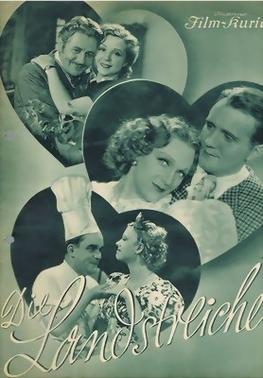
The Vagabonds is a 1937 German operetta film directed by Karel Lamac and starring Paul Hörbiger, Lucie Englisch and Gretl Theimer. It is an adaptation of the 1899 operetta of the same name by Carl Michael Ziehrer.
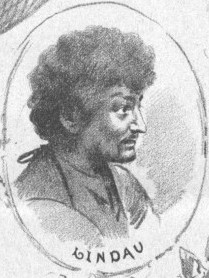
Karl Lindau was an Austrian actor and writer. He excelled in comic roles at the Theater an der Wien, and wrote several plays, librettos for operettas and songs.
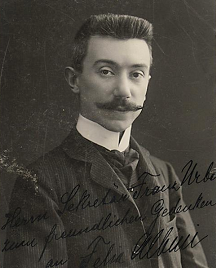
Srećko (Felix) Albini was a Croatian composer, conductor, and music publisher. He was primarily known for his operettas, some of which were adapted into English and performed in London and New York.
References
- ↑ Lamb, Andrew (2001). "Ziehrer, C. M.". In Sadie, Stanley; Tyrrell, John (eds.). The New Grove Dictionary of Music and Musicians (2nd ed.). London: Macmillan Publishers. ISBN 978-1-56159-239-5.
- ↑ Casaglia, Gherardo (2005). "Die Landstreicher, 26 July 1899" . L'Almanacco di Gherardo Casaglia (in Italian).
- ↑ Dietz, Dan (2022). "The Strollers". The Complete Book of 1900s Broadway Musicals. Rowman & Littlefield Publishers. p. 67-68. ISBN 9781538168943.
- ↑ Die Landstreicher (1937) at IMDb
- ↑ Die Landstreicher (1960) at IMDb
- ↑ Die Landstreicher (1968) at IMDb